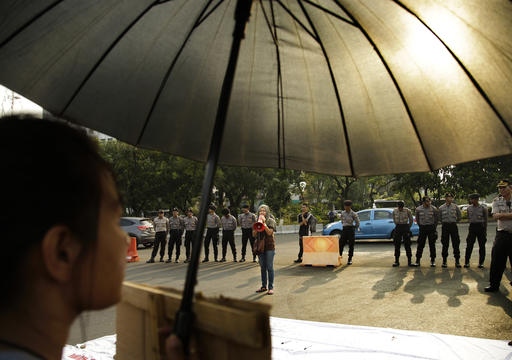
A protester holds a parasol while another speaks with a bullhorn as they hold a rally against death penalty outside the presidential palace in Jakarta, Indonesia, Tuesday, July 26, 2016. AP
JAKARTA, Indonesia (AP) — Indonesian President Joko “Jokowi” Widodo announced a new Cabinet line-up on Wednesday that returns a reformist to the Finance Ministry and puts a former head of the military in charge of security.
Jokowi said that Sri Mulyani Indrawati, who was finance minister from 2005-2010, is returning to the role from her current position as managing director at the World Bank. In her first stint as finance minister she was praised for overhauling a corrupt taxation department and guiding the economy through the 2008 global financial crisis.
Wiranto, a former general who was head of the military when Indonesia’s armed forces committed serious human rights abuses in East Timor, was named the minister for security, political and legal affairs.
He replaced Luhut Binsar Pandjaitan, a close of ally of Jokowi, who becomes the chief minister for maritime issues at a time when Southeast Asian nations are at odds with China over its territorial ambitions in the South China Sea.
READ: Indonesian hostages of Abu Sayyaf located
It is the second reorganization of Jokowi’s Cabinet since the maverick politician became president in 2014, after defeating an establishment candidate in a national election.
A total of 13 ministries were changed and nine of the ministers are new to the Cabinet. Many of the new appointments were in economy-related ministries, reflecting Jokowi’s focus on developing an economy that is one of the largest in Asia but suffers from weak infrastructure and entrenched poverty.
“We have to resolve the poverty problem. We have to reduce the economic gap between the rich and the poor, the gap among regions,” Jokowi said. “We have to strengthen the national economy, we have to open job opportunities as wide as possible for the people.”
READ: Widodo sails to South China Sea on warship